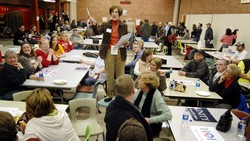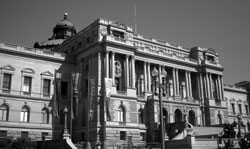For the Democratic Party, the Iowa caucus was supposed to be their springboard into primary season, with Iowa setting the tone for who voters would choose to be the nominee to take on President Donald Trump.
Instead, it turned into a picture of chaos, with reports of failed voting apps and unorganized voting precincts all playing out on national television on Tuesday, Feb. 3.
Nearly a week later, former South Bend, Indiana Mayor Pete Buttigieg was declared the winner with 26.2 percent (13 delegates) of the votes, barely squeaking out a win over Vermont Senator Bernie Sanders, who garnered 26.1 percent of the vote (12 delegates).
The only other candidates to gain more than 10 percent of the vote were Massachusetts Senator Elizabeth Warren with 18 percent (8 delegates), former Vice President Joe Biden with 15.8 percent (6 delegates) and Minnesota Senator Amy Klobuchar with 12.3 percent (1 delegate).
The reason for the week-long delay in results was due to a computer glitch in some of the mobile apps that the Democratic Party used to count votes.
Even as the votes were being tallied, officials from the Iowa Democratic Party were fielding complaints from poll workers who were having trouble using the app.
While state officials had a backup plan to count each vote manually, it meant that the results could not be reported in real-time and would only slowly become available over the next few days.
Gil Eckert, a Specialist Professor of Information Technology (IT), stated that a lack of testing done on the voting app before the Iowa caucus was likely the reason for the glitch.
“You can’t expect good results from an application that hasn’t undergone rigorous testing in a controlled but real-time environment,” said Eckert. “You also can’t expect poll workers, many of whom were probably volunteers, to download and install an app the moment they need to use it.”
According to Patrick Murray, Director of the Monmouth Polling Institute, poor voter turnout at the Iowa caucus, combined with the fact that Iowa does not represent the diversity of the Democratic Party, are among the biggest reasons for calls to change the current system of Iowa being first on the election season’s calendar.
“Just 170,000 out of more than 600,000 Democrats and 700,000 independents showed up,” Murray explained. “Considering how much money campaigns spend there and the overweighed influence Iowa has on the process, the first contest should have a significantly higher turnout. Not only does Iowa not represent the diversity of the Democratic Party nationwide, but the people who show up at the caucus do not even represent all Democrats in Iowa.”
Criticism of the technical problems was shared by nearly every Democratic candidate, including Sanders, the narrow runner-up in the contest, who said the technology had been unfair to everyone in the race.
Trump, who won the Iowa Republican Caucus with 97 percent of the vote after running mostly unopposed, mocked the Democratic Party when speaking to reporters, stating, “They couldn’t even take a simple tabulation and yet they’re telling you how to run the country and how to run health care.”
While the results have finally been determined, protests against the Democratic Party’s handling of the Iowa caucus has not just been about technology, with some questioning if caucuses, where voters must go to a meeting instead of voting on a ballot to participate, are out of touch in the modern political system.
Others have claimed that Iowa, a state with a population that is approximately 90 percent white, is not an accurate representation of the diverse Democratic voting base.
Stephen Chapman, Ph.D., an Assistant Professor of Political Science, agreed that the system of caucuses could place certain additional burdens on voters, but also saw problems with the possibility of abandoning the Iowa caucus.
“The Iowa caucus has had a historically important role in the process,” Chapman said. “State party leaders within the Democratic Party may be wary of shifting away from the status quo as it may cause them to be seen as less important, as we’ve seen with recent discussions concerning a national primary.”
Chapman also stated that, despite the short-term embarrassment that the Democratic Party suffered as a result of the technological difficulties in Iowa, it was unlikely to have any lasting effect during the election season.
As for upcoming predictions about the race for Democratic nomination, Chapman saw it as a three-way race between Buttgieg, Sanders, and Biden, with Sanders projected to win more delegates than the other two candidates in upcoming primaries and caucuses.
In a Monmouth poll from last month, 58 percent of Democrats supported a national primary, where all state would hold primary elections on the same day. Yendeli Bello, a senior political science student, gave her support for a national primary as opposed to separate primaries and caucuses, giving the example of the New Jersey primary not being until late in the primary season.
“More often than not, primary races are usually decided before the end of the primaries, meaning that states with early primaries have a huge influence,” Bello said. “By the time New Jersey has their primaries in June, the race will already have been decided.”
IMAGE TAKEN from NPR




